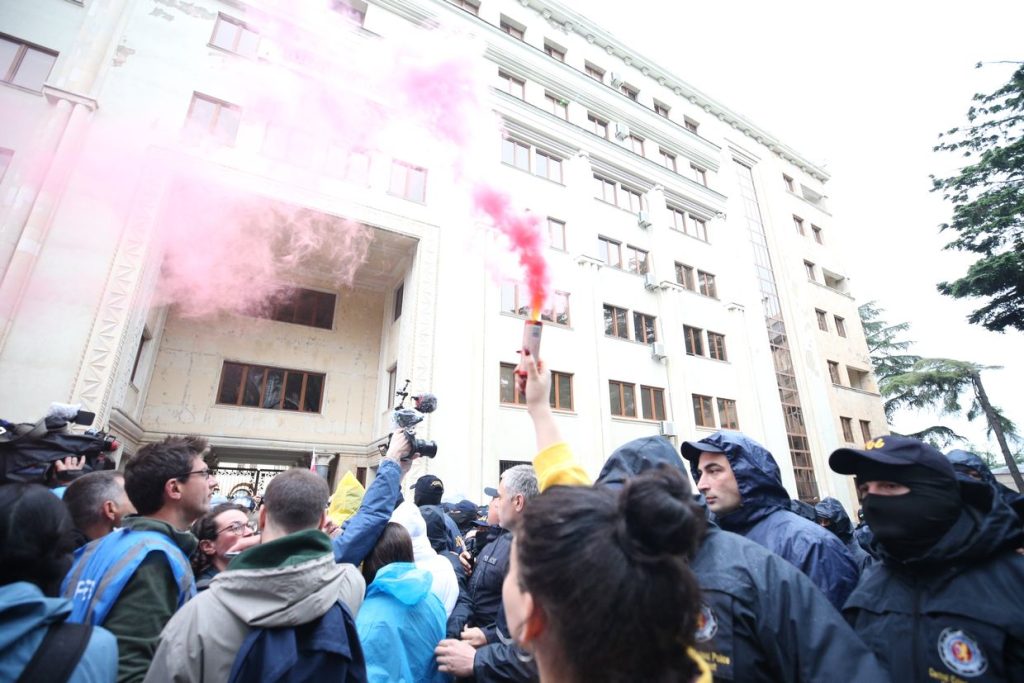The Legal Committee of Georgia’s Parliament recently took just 67 seconds to assess and vote on a controversial foreign agents law, sparking outrage among opposition lawmakers. Tens of thousands of protesters gathered in Georgia’s capital, with over 50,000 people marching through Tbilisi to voice their opposition to the bill. The proposed law would require organizations receiving foreign funding to be labeled as “foreign agents,” drawing comparisons to repressive Russian laws. Opposition politicians were reportedly delayed outside the Parliament building by police, leading to a rushed and contentious vote by the Legal Committee. Former head of Ukraine’s police, Khatia Dekanoidze, condemned the session as “shameful” and “illegitimate,” highlighting concerns about the lack of transparency and fairness in the process.
Georgian President Salome Zourabichvili accused the government of being “prone to making concessions to Russia” in the context of the controversial foreign agents law. The bill, known as the “Russian law” among its opponents in Georgia, has been met with widespread opposition and criticism. The ruling Georgian Dream party is pushing for the law to be adopted in its third and final hearing despite the backlash and protests. The rushed and contentious nature of the vote by the Legal Committee has raised serious concerns about the democratic process and respect for the rule of law in Georgia. The government’s handling of the situation has led to accusations of undemocratic behavior and lack of transparency.
The swift passage of the foreign agents law in Georgia’s Parliament has sparked outrage and protests across the country. Opponents of the bill argue that it threatens freedom of speech and civil society, as well as echoing repressive measures seen in Russia. The law would require organizations receiving foreign funding to be labeled as “foreign agents,” a designation that carries negative connotations and can stigmatize and undermine the work of these organizations. The widespread opposition to the bill reflects broader concerns about the direction of democracy and governance in Georgia, with many questioning the government’s commitment to upholding democratic principles and protecting fundamental rights.
The controversial foreign agents law has become a focal point of political and social unrest in Georgia, with tens of thousands of citizens taking to the streets to protest against the bill. The rushed and contentious vote by the Legal Committee, which lasted just 67 seconds, has raised serious doubts about the legitimacy and transparency of the parliamentary process. Opposition lawmakers have accused the government of undemocratic behavior and deliberate exclusion, highlighting concerns about the erosion of democratic norms and principles in the country. The passage of the law in its final hearing on May 14 will likely intensify tensions and deepen divisions within Georgian society.
The involvement of former head of Ukraine’s police, Khatia Dekanoidze, in condemning the rushed and secretive vote on the foreign agents law adds a significant voice to the chorus of opposition against the bill. Dekanoidze’s experience in law enforcement and her perspective as an opposition politician lend credibility to the concerns raised about the lack of transparency and fairness in the legislative process. Her characterization of the session as “shameful” and “illegitimate” underscores the gravity of the situation and the need for robust defense of democratic norms and values. As the government moves forward with the final hearing on the law, the pressure from both domestic and international actors to uphold democratic standards will likely continue to mount.
The passage of the foreign agents law in Georgia represents a critical juncture in the country’s democratic development and future trajectory. The widespread opposition and protests against the bill signal a deep-seated concern about the erosion of fundamental rights and freedoms in the country. The government’s decision to push for the law’s adoption despite the backlash and criticism raises questions about its commitment to democratic governance and respect for the rule of law. As Georgia grapples with these challenges, the role of civil society, independent media, and international partners in supporting democratic values and institutions will be crucial in safeguarding the country’s democratic future.


